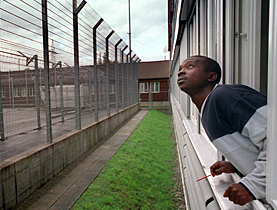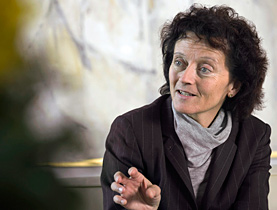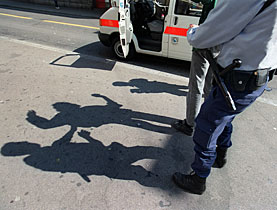Campaign tackles “hurtful” refugee stereotypes

Worldwide, more than 42 million people are on the run. A small percentage seek haven in Switzerland but when they arrive, some are confronted with prejudice.
The oft-repeated stereotype that asylum-seekers are drug dealers and criminals is “factually wrong, hurtful and degrading for those affected”, says Beat Meiner, the secretary-general of the Swiss Refugee Council.
Meiner told swissinfo.ch what while he believes Switzerland enjoys a worldwide reputation as a country with a great humanitarian tradition, the willingness to “help people in need” is increasingly being replaced with “fear and prejudice”.
The Refugee Council has planned a series of hard-hitting campaigns in German- and French-speaking Switzerland to make people think twice about stereotypes.
“All dealers?” challenge posters bearing a bold, bright-yellow typeface. The group’s campaign was launched on Saturday.
Statistics from the Zurich cantonal police department for 2008 indicate that fewer than 50 drug-trafficking suspects in the jurisdiction were asylum-seekers.
Good acceptance rate
The promotion is taking place in collaboration with the United Nations High Commission for Refugees (UNHCR).
Hans Lunshof, head of the UNHCR’s liaison office for Switzerland and Liechtenstein says Switzerland plays an “important role” and offers “significant financial support” to the humanitarian body.
“The acceptance rate in Switzerland is quite good,” Lunshof said.
Most of Switzerland’s refugee applicants are people trying to flee brutal civil conflicts. Switzerland’s Federal Migration Office in 2008 decided two-thirds of cases in favour of the applicant.
“The petitions of the remaining 35 per cent were not rejected because they lied but because their arguments were not satisfactory,” Meiner said.
Old traditions
For several months now, the UNHCR has been trying to get Switzerland to reintroduce its tradition of accepting a refugee quota. That is how Hungarians in 1956 and Czechoslovakians in 1968 were granted asylum without their applications being examined individually.
“Resettlement, as we say, is an important instrument of protection for people who are trapped in refugee camps between fronts,” said Lunshof. “More than a million people languish sometimes for years in camps without any prospects.”
That is happening now with Iraqi refugees in Syria or Jordan, Eritreans in Sudan and Burmese in Thailand.
The Federal Migration Office has set up a working group now looking to clarify the possibilities for accepting a certain number of refugees. Formally, nothing is standing in the way. Asylum rules, which were revised in 2006, explicitly allow for quotas.
The government is the deciding authority and Lunshof figures the cabinet will come to a decision sometime this year.
In the meantime, the UNHCR is looking to resettle 127,000 people worldwide. Most quota refugees end up in the United States, Canada and the northern European countries. Lunshof says that altogether there are 15 states that accept quota refugees.
Andreas Keiser, swissinfo.ch (Translated from German by Justin Häne and Tim Neville)
The Swiss Refugee Council’s campaign begins on June 20.
Events advocating for the worldwide rights of refugees will be carried out in many Swiss towns and villages.
The Swiss Refugee Council was founded in 1980.
In 2008 more than 16,600 asylum requests were filed, an increase of 53 per cent on the previous year.
Eritreans had the greatest number of applications, followed by Somalis and Iraqis.
The main reason for this increase is a shift in the routes migrants are using to reach Europe.
Altogether there are 40,794 people going through the asylum process, which is 0.7 per cent less than in 2007.
In the last year 11,062 asylum requests were granted in the first court, an increase of 9.9 per cent.
More than 2,260 people finally received asylum, an acceptance rate of 23 per cent.

In compliance with the JTI standards
More: SWI swissinfo.ch certified by the Journalism Trust Initiative



You can find an overview of ongoing debates with our journalists here. Please join us!
If you want to start a conversation about a topic raised in this article or want to report factual errors, email us at english@swissinfo.ch.